Words Sarah Langton-Lockton Photographs Elvis & Kresse
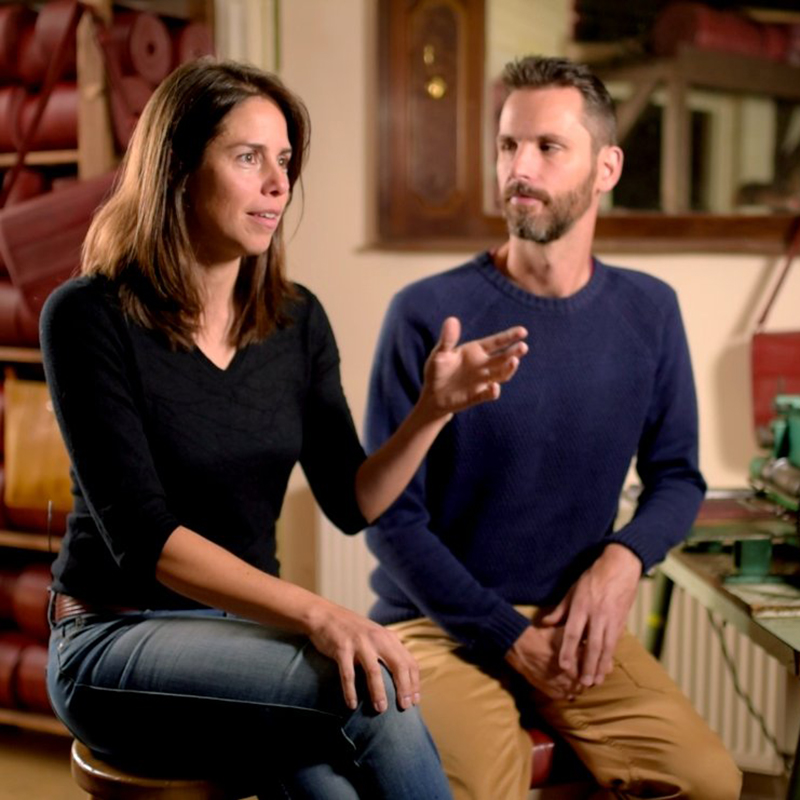
Kresse and Elvis at home
The setting is idyllic: a handsome mill, dated 1837, fronting the road and overlooking at the rear a large mill pond, the home of industrious coots, mallards and the occasional swan. On the strip of terrace between the mill building and the pond is a wooden pergola. Devoid of plants, it gives a clue as to what goes on inside the building. Hanging in long strips, drying in the spring air, are bright yellow pieces of fireman’s hose, newly washed and ready to be reworked into the covetable handbags, wallets, laptop and smartphone cases, belts and key rings the company makes from what Kresse calls this ‘heroic’ material.
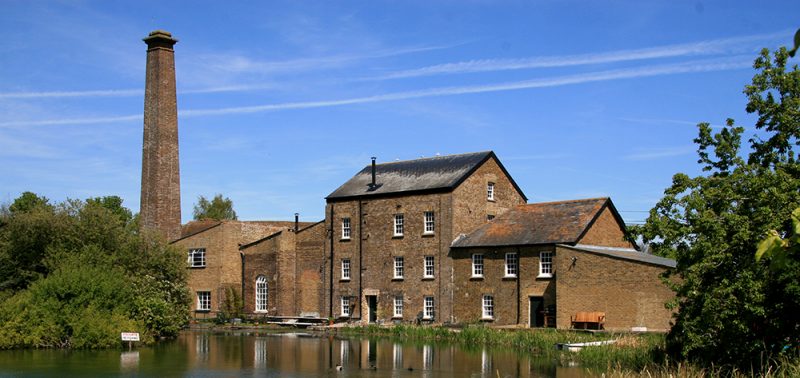
Tonge Mill overlooks its large mill pond
Canadian-born Kresse Wesling (Kresse is her grandmother’s name) says she has been fascinated by waste since childhood – at her primary school the class could vote on what places they wanted to visit, so they went to power stations, sewage plants and recycling centres. She met her partner Elvis (James Henrit) in Hong Kong, where she was working in venture capital and he in project management. In 2004 they moved to London. One day she was at a rather dull environmental reporting seminar. Sitting in the back row, she got chatting to some people from the London Fire Brigade. They explained that they had a problem: fire hoses that had outlived their useful life could not be recycled and therefore went to landfill. What could be done, they wondered, to make sure new uses were found for this robust, beautiful and precious resource?
Kresse rose to the challenge: ‘I’m like a dog,’ she says, ‘I just follow my nose.’ Research revealed that until the Dutch invented leather hoses in the late 1600s, buckets were used to fight fires. Linen hoses, prone to leaking, came next, replaced in time by the modern fire hose. This consists of a nylon core with a nitrile rubber jacket extruded through and around it in a seamfree circular weave. There are two factories in the world that make this fire hose: one in New Jersey and the other in North Yorkshire. ‘The North Yorkshire hoses,’ she says, ‘have a standard length of 22 metres because that is the length of the factory shed.’
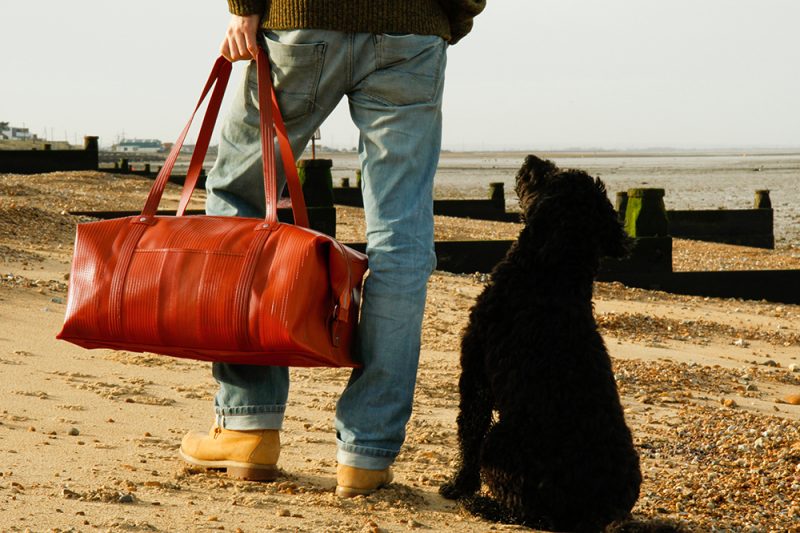
Elvis with a red weekend bag, and Monty, who is a gorgeous springerdoodle/sproodle, pictured on Whitstable beach
For fire hoses damaged beyond easy repair or which had reached their approved health and safety life of 25 years there was no alternative to landfill. Elvis and Kresse set up their company in 2005 to change this. They spent a lot of time working out what fire hose was before they made their first product, a belt. ‘But after that belt we never looked back.’ One hundred and seventy-five tonnes of material have now been reclaimed and reworked into ‘beautiful lifestyle accessories’ – Kresse’s description. Fifty per cent of profits go to the Fire Fighters Charity, which runs two rehabilitation centres with a focus on mental health – many fire fighters develop Post Traumatic Stress Disorder. The remaining 50 per cent is invested in the company.
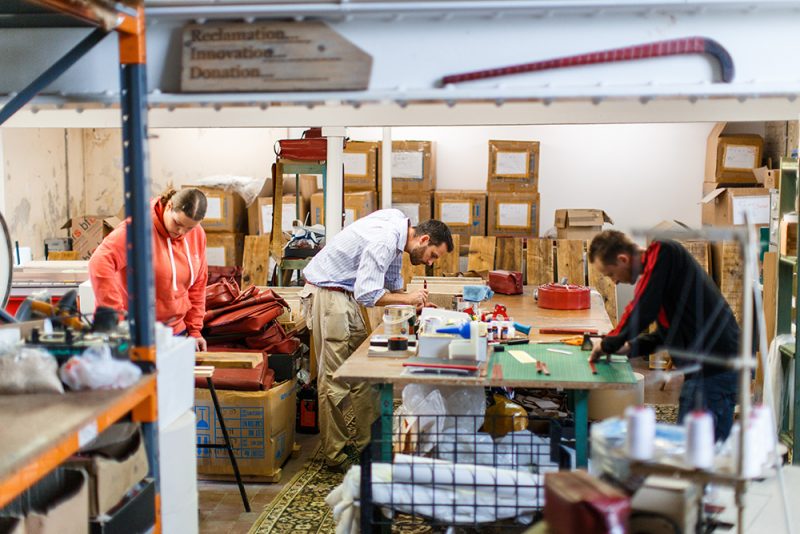
In the workshop
‘We started the business in London,’ says Kresse. ‘Then we went to Bournemouth because Elvis had a friend there training to be a surgeon. We couldn’t afford London because we needed space to store all this rubbish.’ Research on the internet led to Tonge Mill. Elvis saw it on 3 February 2013 and they got the keys on 22 June. ‘I never saw it before we bought it,’ says Kresse. ‘Parts of the building had heat, most of it was an absolute disaster, but we could afford it.’ Six years on, the renovated mill is both a home and a productive workshop.
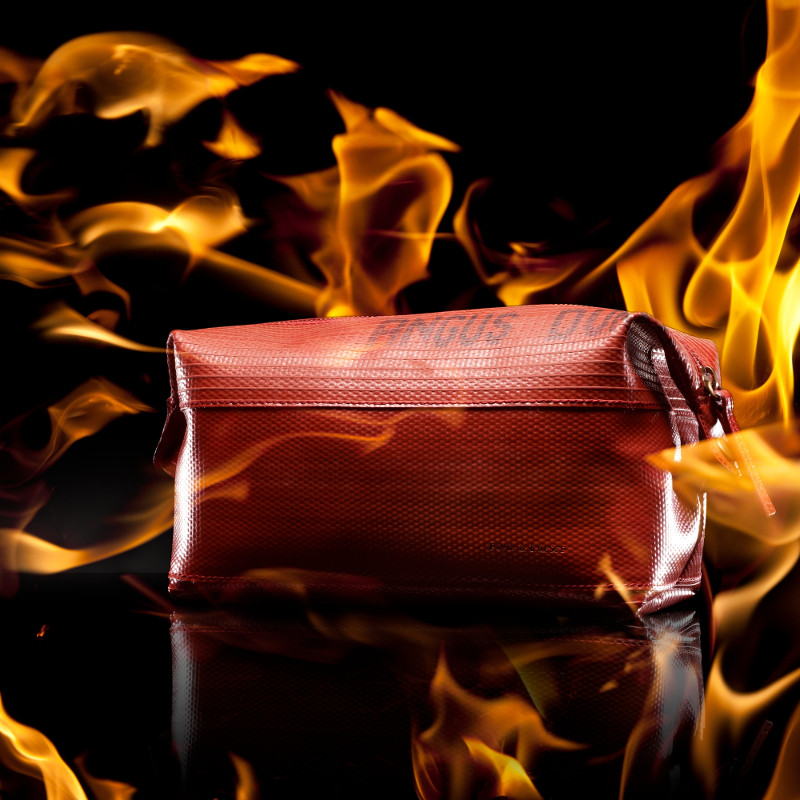
Wash bag on fire!
Most hoses are a 10 cm diameter layflat hose which means they flatten out when empty. This makes them easier to roll, store and carry. In the first process towards converting them into a new product, the decommissioned fire hose has the baked-in synthetic curve cut off. The hose is then washed – in the beginning by hand and now by a giant Electrolux – then peeled in half by the splitter to form 10 cm wide strips for making bags and wallets. The result, says Kresse, ‘is an exciting, alternative textile – beautiful, characterful, robust and mostly red.’ Some yellow hose (five per cent) is available, and occasionally blue and black. The clicking press then cuts all the pattern pieces. The final product is practical, stylish and unique – ‘re-engineered tradition’, Kresse and Elvis call it. Prices, based on the cost of labour, are reasonable – the women’s tote bag, for example, costs £199. You can keep it pristine with a damp cloth and a little furniture polish.
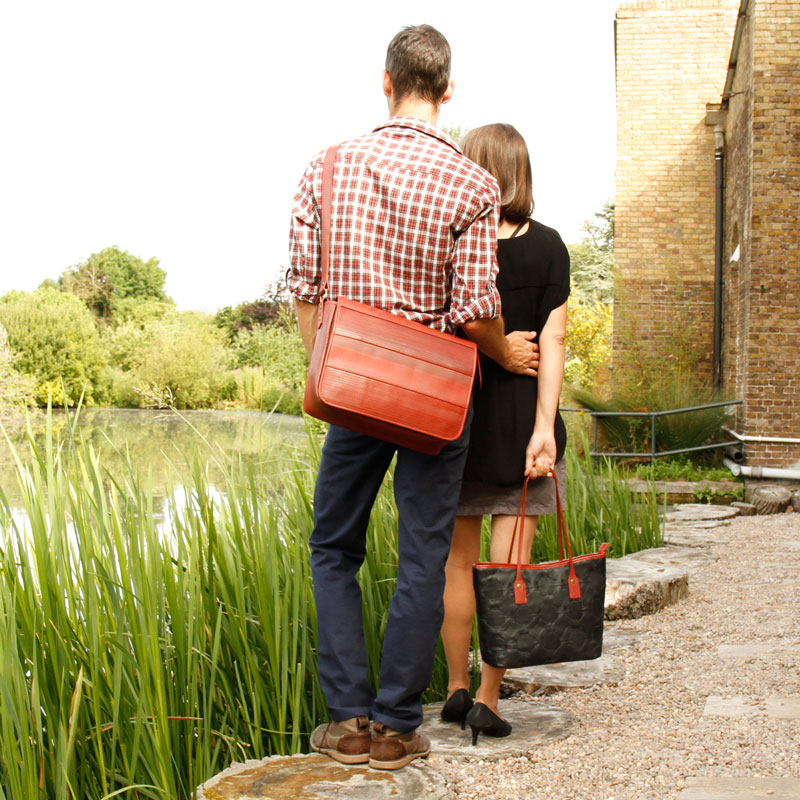
On the terrace between the mill house and the pond, Elvis with a fire-hose messenger bag and Kresse with a leather tote
In 2017 Elvis & Kresse entered a partnership with the Burberry Foundation to tackle an even larger problem – the estimated 800,000 tonnes of waste produced each year by the world’s leather industry. The Foundation’s grant is to support over five years the transformation of some 120 tonnes of leather offcuts from Burberry into new products. The clicking press cuts these offcuts into three shapes, which can be interlocked by hand to form new hides. From these are made bags, purses, washbags and distinctive, hardwearing rugs. Customers can also order a diy rug, with 40 per cent of the work to do themselves. ‘Some families do them together, over Christmas for example,’ says Kresse. Half of the profits from leather items are donated to charities concerned with renewable energy.
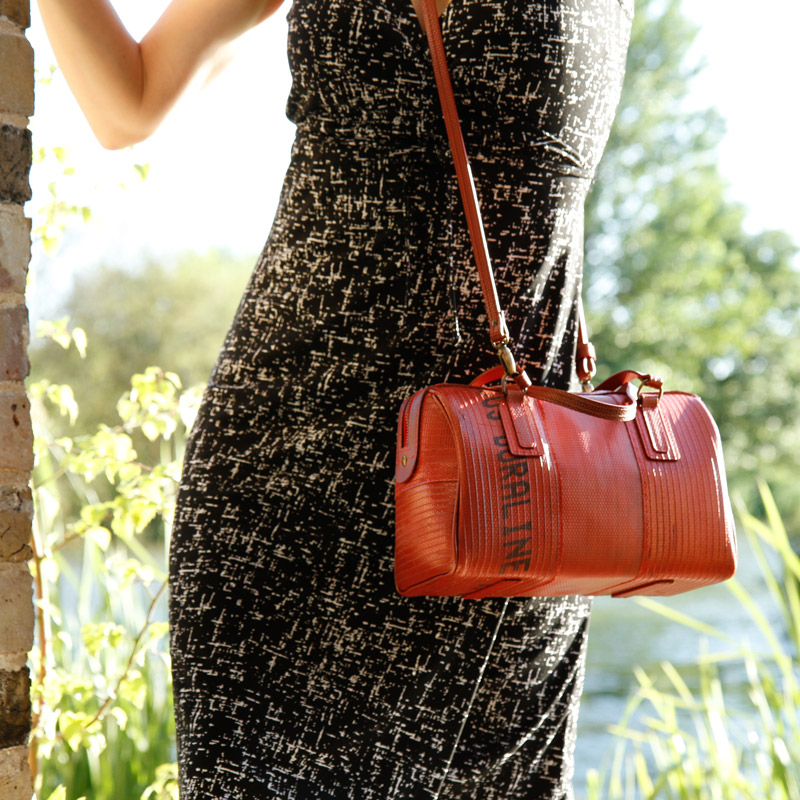
The post bag with a shoulder strap
Elvis & Kresse now rescues and finds new uses for all kinds of apparently useless waste, including, in addition to fire hose and leather, parachute silk (used to line bags and wallets), shoe boxes (flattened and made into packaging and labels) and jute or hessian coffee sacks, from which individual strands are teased out to become the string on swing labels.
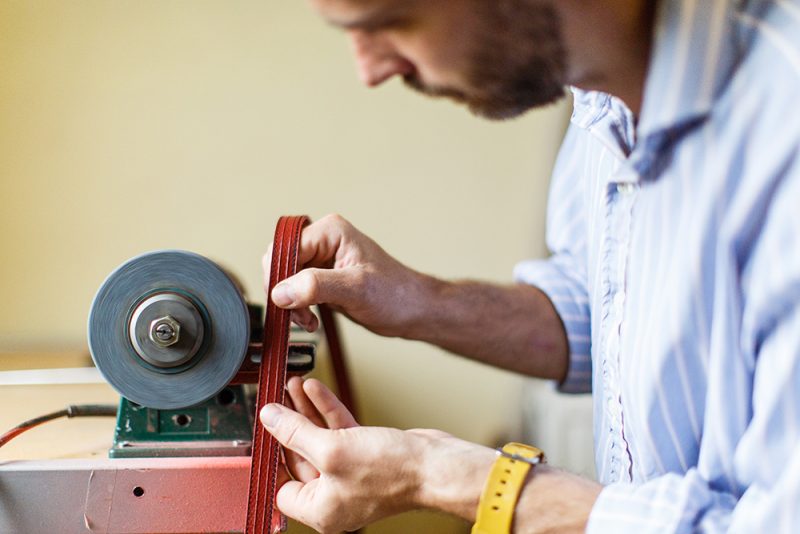
Skills are self taught
Seven people work in Tonge Mill and a further 10 in the workshop in Istanbul, where there is still an active leather quarter. Two employees, Megan and Ashley, started as apprentices and have learnt all the manufacturing processes including the laser-applied branding. ‘Our goal is to hire local people,’ says Kresse. Both she and Elvis are self taught as designers and makers. Elvis has learnt how to sew and is a talented designer. Both have learnt how to build a website. Seventy per cent of sales are online, half of them from the UK, lots from Europe and increasingly America. Many people shop online at the weekend, so dealing with orders makes Monday a busy day.
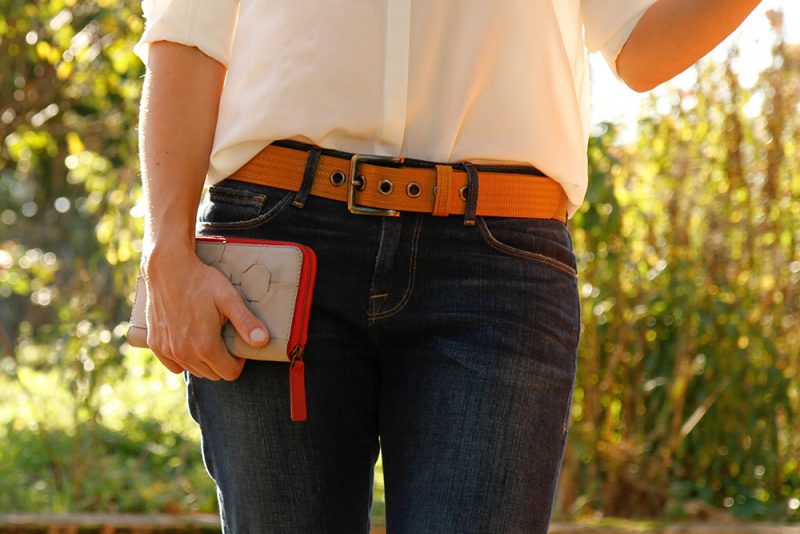
‘Beautiful lifestyle accessories’
Kresse is in demand as a motivational speaker. The week before our interview she was at Cambridge University talking about innovation, social enterprise and the circular economy (this is an economic system which keeps resources in use and minimises waste). She is a Visiting Professor at Oxford University’s Said Business School. Elvis & Kresse is a B Corp, an American initiative that certifies businesses for which serving people and the planet are the ultimate bottom line. ‘We see ourselves as innovators,’ says Kresse. ‘We don’t mention turnover.’ Elvis & Kresse is a great business for now and a role model for a greener and kinder future.
Tonge Mill is open on Mondays to Fridays from 8:30am to 5pm.
Visit www.elvisandkresse.com to buy products online or sign up for a workshop to make your own bag.
Elvis & Kresse
Tonge Mill
Church Road
Tonge
Kent
ME9 9AP
Tel 01795 484235
Words: Sarah Langton-Lockton. Photographs: Elvis & Kresse.